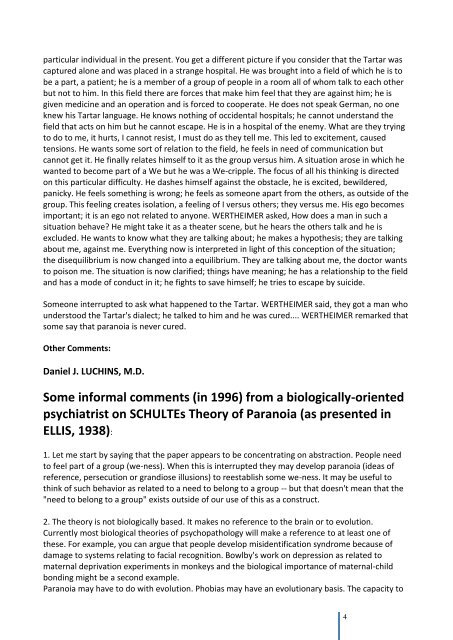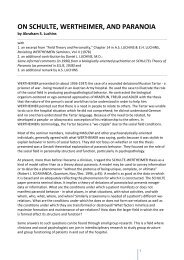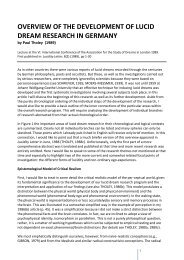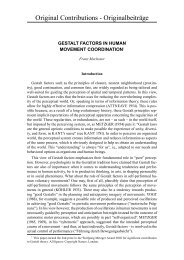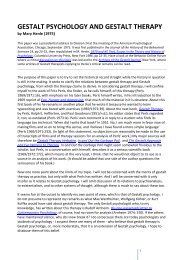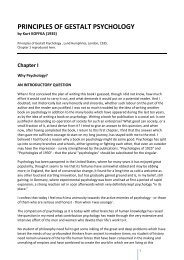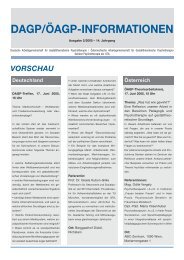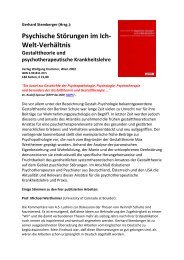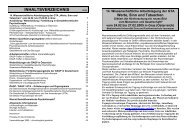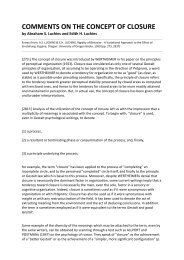pdf-Download - Society for Gestalt Theory and its Applications (GTA)
pdf-Download - Society for Gestalt Theory and its Applications (GTA)
pdf-Download - Society for Gestalt Theory and its Applications (GTA)
Create successful ePaper yourself
Turn your PDF publications into a flip-book with our unique Google optimized e-Paper software.
particular individual in the present. You get a different picture if you consider that the Tartar was<br />
captured alone <strong>and</strong> was placed in a strange hospital. He was brought into a field of which he is to<br />
be a part, a patient; he is a member of a group of people in a room all of whom talk to each other<br />
but not to him. In this field there are <strong>for</strong>ces that make him feel that they are against him; he is<br />
given medicine <strong>and</strong> an operation <strong>and</strong> is <strong>for</strong>ced to cooperate. He does not speak German, no one<br />
knew his Tartar language. He knows nothing of occidental hospitals; he cannot underst<strong>and</strong> the<br />
field that acts on him but he cannot escape. He is in a hospital of the enemy. What are they trying<br />
to do to me, it hurts, I cannot resist, I must do as they tell me. This led to excitement, caused<br />
tensions. He wants some sort of relation to the field, he feels in need of communication but<br />
cannot get it. He finally relates himself to it as the group versus him. A situation arose in which he<br />
wanted to become part of a We but he was a We-cripple. The focus of all his thinking is directed<br />
on this particular difficulty. He dashes himself against the obstacle, he is excited, bewildered,<br />
panicky. He feels something is wrong; he feels as someone apart from the others, as outside of the<br />
group. This feeling creates isolation, a feeling of I versus others; they versus me. His ego becomes<br />
important; it is an ego not related to anyone. WERTHEIMER asked, How does a man in such a<br />
situation behave? He might take it as a theater scene, but he hears the others talk <strong>and</strong> he is<br />
excluded. He wants to know what they are talking about; he makes a hypothesis; they are talking<br />
about me, against me. Everything now is interpreted in light of this conception of the situation;<br />
the disequilibrium is now changed into a equilibrium. They are talking about me, the doctor wants<br />
to poison me. The situation is now clarified; things have meaning; he has a relationship to the field<br />
<strong>and</strong> has a mode of conduct in it; he fights to save himself; he tries to escape by suicide.<br />
Someone interrupted to ask what happened to the Tartar. WERTHEIMER said, they got a man who<br />
understood the Tartar's dialect; he talked to him <strong>and</strong> he was cured.... WERTHEIMER remarked that<br />
some say that paranoia is never cured.<br />
Other Comments:<br />
Daniel J. LUCHINS, M.D.<br />
Some in<strong>for</strong>mal comments (in 1996) from a biologically-oriented<br />
psychiatrist on SCHULTEs <strong>Theory</strong> of Paranoia (as presented in<br />
ELLIS, 1938):<br />
1. Let me start by saying that the paper appears to be concentrating on abstraction. People need<br />
to feel part of a group (we-ness). When this is interrupted they may develop paranoia (ideas of<br />
reference, persecution or gr<strong>and</strong>iose illusions) to reestablish some we-ness. It may be useful to<br />
think of such behavior as related to a need to belong to a group -- but that doesn't mean that the<br />
"need to belong to a group" exists outside of our use of this as a construct.<br />
2. The theory is not biologically based. It makes no reference to the brain or to evolution.<br />
Currently most biological theories of psychopathology will make a reference to at least one of<br />
these. For example, you can argue that people develop misidentification syndrome because of<br />
damage to systems relating to facial recognition. Bowlby's work on depression as related to<br />
maternal deprivation experiments in monkeys <strong>and</strong> the biological importance of maternal-child<br />
bonding might be a second example.<br />
Paranoia may have to do with evolution. Phobias may have an evolutionary basis. The capacity to<br />
4


